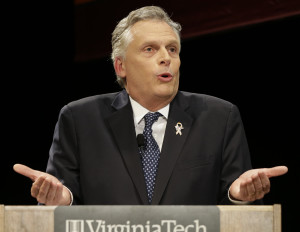
Donating a hefty sum to Gov. Terry McAuliffe’s political endeavors won’t guarantee you a spot governing the commonwealth’s prestigious universities, but it doesn’t hurt.
A number of McAuliffe’s more than 50 new appointees to governing boards at state institutions of higher learning also happen to have donated hefty sums to the Democratic governor’s political causes.
This wouldn’t be the first time McAuliffe has placed donors on university boards. In a batch of 65 new appointees last summer, at least 17 of them were campaign donors. Former Gov. Bob McDonnell, now fighting an unrelated public corruption conviction, also appointed donors to prestigious posts.
- Tammy S. Murphy is an executive in Red Bank, New Jersey who donated $15,000 towards McAuliffe’s 2013 campaign for governor and $10,000 towards his political action committee, Common Good VA, according to campaign finance records from the Virginia Public Access Project. According to a news release from the governor’s office last week, she is also one of the newest appointees to the prestigious, if not recently controversial, University of Virginia’s Board of Visitors.
- Jeffrey Clemens Walker, a successful New York City-based businessman who graduated from UVA and served as the undergraduate business school’s president for 10 years, is also one of the newest appointees to the UVA Board of Visitors. He donated even more generously to McAuliffe — $50,000 to his gubernatorial bid, $10,000 to his PAC and $10,000 to his inaugural campaign, according to VPAP records. Walker has been criticized in the past for saying in-state students should pay more for their tuition, and has wanted to change the board’s composition so the governor would only pick nine members, while UVA movers and shakers would select the rest.
The fact that some donors become appointees doesn’t mean it’s a pay-to-play setup, said Pete Quist, research director for the Montana-based National Institute on Money in State Politics. It’s more likely an indication of professional affiliation, since people tend to choose people they already know.
“The question of political donations brings up, it’s basically an illustration of a relationship,” Quist said. “These folks might have known each other through professional relationships, or that nature, and relationships at all levels of government provide access.”
Quist stressed that things have to be analyzed on a “case-by-case” basis, making sure donations don’t prohibit qualified people from becoming appointees, but also making sure appointees are qualified.
The governor’s office did not return requests for comment.
Donors, however, didn’t just make it onto UVA’s governing board.
- Catherine B. Reynolds, CEO of the Catherine B. Reynolds Foundation who was appointed to the State Board for Community College, donated $50,000 to McAuliffe’s campaign and $25,000 to his inaugural committee, according to VPAP records.
- New GMU governing board appointee Stephen M. Cumbie, a real estate developer also from McAuliffe’s Virginia hometown of McLean, has donated $20,000 to McAuliffe’s 2013 election campaign, and $250,000 total to Democratic candidates in the state since 1996. But Cumbie didn’t just donate along party lines. He’s also donated nearly $30,000 to Republican candidates and causes in that same time period.
- David T. Petersen, another new GMU board appointee from Vienna, donated $20,500 to McAuliffe’s 2013 campaign for governor, another $12,500 to his PAC, Common Good VA, and $2,500 to his inaugural committee. VPAP doesn’t have a record of Petersen donating to any other politicians or political causes in the commonwealth.
- Sudhakar V. Shenoy, the founder, chairman and CEO of IT company IMC, Inc. who received an appointment to Virginia Commonwealth University’s governing board,donated $50,000 to McAuliffe’s campaign — $40,000 to his gubernatorial campaign and $10,00 to his PAC.
There are some slightly smaller donors who became board members in the realm of higher education, too.
- Robert R. Hatten, a new Christopher Newport University Board of Visitors member and managing partner at the law firm Patten, Wornom, Hatten & Diamonstein, has donated more than $419,000 to Democratic candidates through the years, including $11,000 to McAuliffe’s 2013 gubernatorial campaign and $5,000 to McAuliffe’s PAC, according to VPAP records.
- James Hixon, executive vice president of Norfolk Southern Corp. and a new College of William and Mary appointee, donated $10,000 to McAuliffe’s campaign, $5,000 to McAuliffe’s PAC and $16,000 to Lieutenant Gov. Ralph Northam’s campaign. The Virginia Beach resident also gave $9,500 to former Gov. Bob McDonnell’s campaign efforts, among other candidates.
- Carol S. Shapiro, a plastic surgeon from Fairfax Station appointed to VCU’s governing board, donated $5,000 to McAuliffe’s gubernatorial bid.
- Karen Schultz, a new College of William and Mary board appointee, donated $2,700 to McAuliffe’s 2013 campaign efforts.
- William C. Hall, Jr., who retired from Dominion Resources and is joining the governing board of the State Board for Community Colleges, donated $1,500 to McAuliffe’s campaign. Hall also made small donations to lots of other candidates, Democratic and Republican, through the years.
- Whittington W. Clement, registered lobbyist and partner at law firm Hunton & Williams, and now an appointee to the UVA’s governing board, also gave a $1,500 donation to McAuliffe’s campaign for governor.
Of course, McAuliffe is far from the first governor to place donors on university boards as McDonnell also wasn’t shy about the practice.
— Kathryn Watson is an investigative reporter for Watchdog.org’s Virginia Bureau, and can be found on Twitter @kathrynw5.


